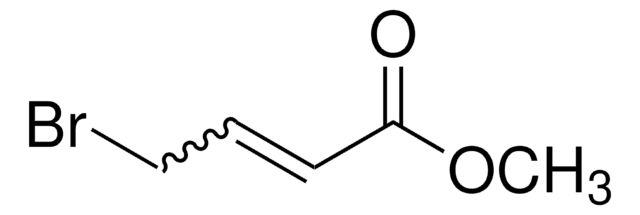16505
Methyl trans-4-bromo-2-butenoate
technical, ≥90% (GC)
Synonym(s):
Methyl 4-bromocrotonate
Sign Into View Organizational & Contract Pricing
All Photos(2)
About This Item
Linear Formula:
BrCH2CH=CHCOOCH3
CAS Number:
Molecular Weight:
179.01
Beilstein:
1745755
MDL number:
UNSPSC Code:
12352100
PubChem Substance ID:
NACRES:
NA.22
Recommended Products
grade
technical
Assay
≥90% (GC)
contains
silver wool as stabilizer
impurities
~3% methyl cis-4-bromo-2-butenoate
refractive index
n20/D 1.501
bp
70 °C/0.03 mmHg (lit.)
density
1.498 g/mL at 20 °C (lit.)
functional group
bromo
ester
storage temp.
2-8°C
SMILES string
COC(=O)\C=C\CBr
InChI
1S/C5H7BrO2/c1-8-5(7)3-2-4-6/h2-3H,4H2,1H3/b3-2+
InChI key
RWIKCBHOVNDESJ-NSCUHMNNSA-N
Application
Methyl trans-4-bromo-2-butenoate (Methyl 4-bromocrotonate) was used in the synthesis of highly substituted benzoxepines or benzopyrans and L-α-amino [4,5-3H]adipic acid.
Signal Word
Warning
Hazard Statements
Precautionary Statements
Hazard Classifications
Eye Irrit. 2 - Skin Irrit. 2 - STOT SE 3
Target Organs
Respiratory system
Storage Class Code
10 - Combustible liquids
WGK
WGK 3
Flash Point(F)
197.6 °F
Flash Point(C)
92 °C
Personal Protective Equipment
dust mask type N95 (US), Eyeshields, Gloves
Choose from one of the most recent versions:
Already Own This Product?
Find documentation for the products that you have recently purchased in the Document Library.
Customers Also Viewed
An Allylpalladium (IV) Intermediate in the Synthesis of Highly Substituted Benzoxepines and Benzopyrans via Reactions of Stable Pallada (II) cycles with Allyl Bromides.
Guo R, et al.
Organometallics, 26(15), 3784-3783 (2007)
J O'Sullivan et al.
The Biochemical journal, 184(2), 421-426 (1979-11-15)
1. delta-(L-alpha-Amino[4,5-3H]adipyl)-L-cysteinyl-D-[4,4-3H]valine has been synthesized from its constituent amino acids, the L-alpha-amino[4,5-3H]adipic acid being obtained by reduction with 3H2 of methyl 5-acetamido-5,5-diethoxycarbonylpent-2-enoate and subsequent decarboxylation and hydrolysis. 2. In a cell-free system prepared by lysis of protoplasts of Cephalosporium acremonium
Our team of scientists has experience in all areas of research including Life Science, Material Science, Chemical Synthesis, Chromatography, Analytical and many others.
Contact Technical Service





![1,8-Diazabicyclo[5.4.0]undec-7-ene 98%](/deepweb/assets/sigmaaldrich/product/structures/120/564/5b373e23-1624-489c-8efb-692de0f96ffb/640/5b373e23-1624-489c-8efb-692de0f96ffb.png)






